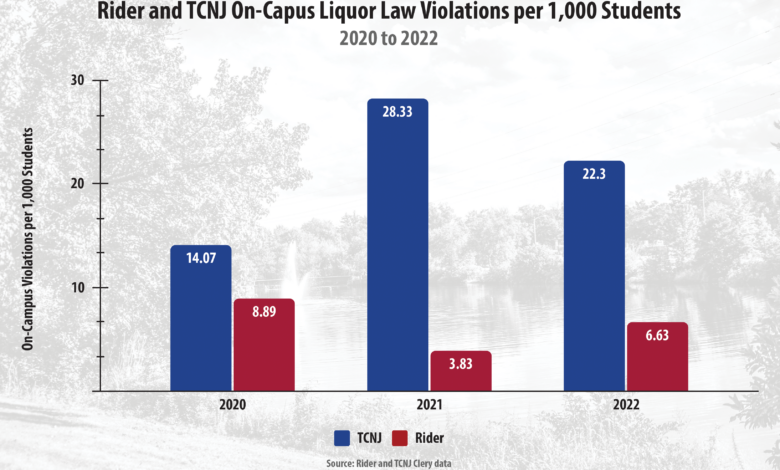
Rider liquor-violation rates fall far below TCNJ
By Jake Tiger
The day after a Rider freshman consumed nearly an entire bottle of vodka during a fraternity hazing ritual, his parents, seeing that he had succumbed to the effects of alcohol poisoning, decided to take their 18-year-old son, Gary DeVercelly Jr., off life support on March 30, 2007.
Since then, Rider’s alcohol policy tightened, its fraternity scene withered and student alcohol violations have plummeted to a fraction of what they once were, according to the university’s annual fire and safety reports.
Rider’s Clery data shows that on-campus liquor law violations per 1,000 students plummeted from 58.63 in 2010 to 6.63 in 2022, and total liquor law violations dropped by over 200 cases over the 12-year period.
The institution has been without an alcohol-related arrest since 2015, when it had only one.
While Rider’s undergraduate enrollment has seen a noticeable dip since 2010, falling from 4,588 to 3,168 in 2022, the decreased rate of liquor law violations suggests that alcohol is less common as a whole — a trend largely seen across the country.
“You look at the national data for drinking and alcohol, that’s going down,” said James G. Waldon, Rider’s director of Public Safety. “And some of it is the educational programs I know they did here at Rider.”
A study conducted at the University of Michigan and Texas State University found that from 2002 to 2018, alcohol abstinence among college students rose from 20% to 28%.
Still, Rider’s numbers are low by both national and local standards, as peer institutions like The College of New Jersey are behind the university when it comes to policing alcohol.
Rider had 6.63 on-campus alcohol violations per 1,000 students in 2022, while TCNJ had 22.3 infractions per 1,000 students. In 2021, TCNJ’s rate
was more than seven times higher than that of Rider, according to clery data.
TCNJ Police Department declined an interview with The Rider News regarding the college’s liquor violations and alcohol policy.
Rider made changes to its alcohol policy and campus culture following the death of DeVercelly that may have contributed to the drastic drop in liquor violations.
As part of a settled lawsuit with the DeVercelly family, Rider announced changes to its alcohol policy in 2009, deeming all Greek organizations on campus “dry” by banning the use of alcohol and increasing the consequences for liquor and hazing violations.
Rider stopped recognizing DeVercelly’s fraternity, Phi Kappa Tau, in August 2007 following the freshman’s death, and since then, only one other has been dropped for alcohol violations: Zeta Beta Tau in November 2007.
The university also no longer has dedicated houses for its fraternities as it did in 2007. The former home of Phi Kappa Tau was converted to Lake House, a residence hall, and the five on-campus fraternities that are still recognized all share University House.
Senior sports media major Jay Johnson, who has been a community assistant in Gee Hall since 2022, said that his experience in regulating alcohol on campus has been more geared toward student mental health, rather than the partying and hazing it was once associated with.
If anything, groups of students will drink in a dorm room only so they can leave and party somewhere else, according to Johnson.
“[It’s been] more wellness stuff … people who have been drinking alcohol to cope with stuff,” said Johnson. “They do a lot of the pregaming there and then they go elsewhere. It’s been hard to crack down on partying because they usually go off campus.”
According to Keith Kemo, director of Rider’s Office of Community Standards, the university does not plan to change this, even if the fraternities are located off campus.
“There are no plans to reinstate any previous fraternities,” said Kemo. “All the fraternities we recognize are based on campus.”
Phi Kappa Tau has been eligible to apply for reinstatement at Rider since September 2014, but still remains unrecognized. Kemo could not state whether or not the fraternity had tried to make a return to Rider since then.
While Rider only recognizes five fraternities, TCNJ recognizes 14 and has consistently higher rates of liquor law violations among students when compared to Rider.
According to the college’s website, since 2016, TCNJ has stopped recognizing three fraternities due to alcohol or hazing violations, including its Phi Kappa Tau chapter — the same fraternity that hazed DeVercelly to death.


